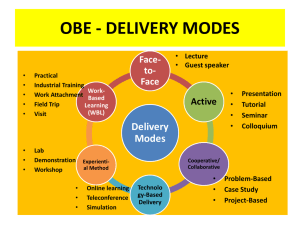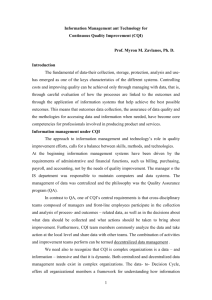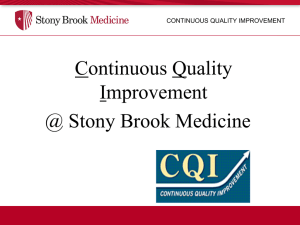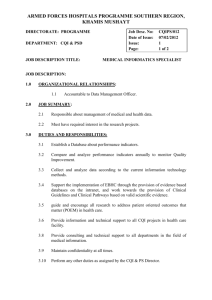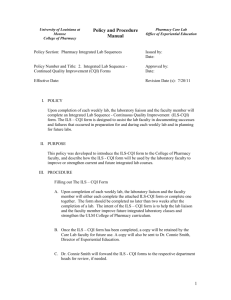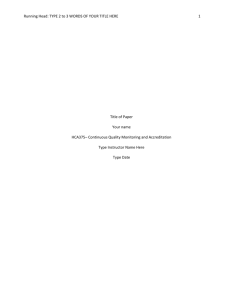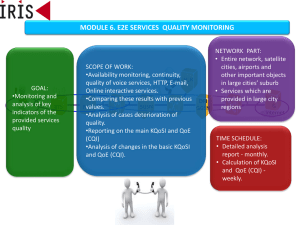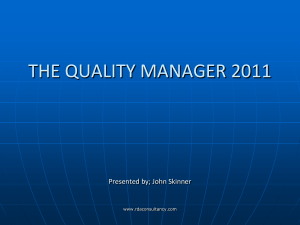Steering Committee Resource Materials
advertisement
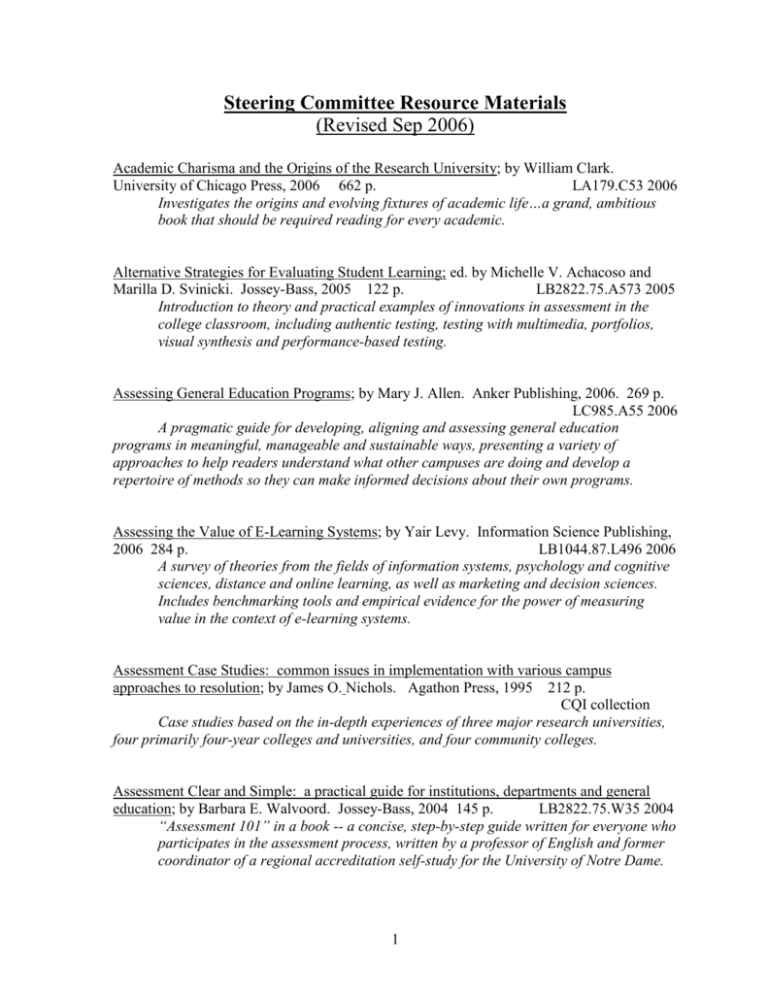
Steering Committee Resource Materials (Revised Sep 2006) Academic Charisma and the Origins of the Research University; by William Clark. University of Chicago Press, 2006 662 p. LA179.C53 2006 Investigates the origins and evolving fixtures of academic life…a grand, ambitious book that should be required reading for every academic. Alternative Strategies for Evaluating Student Learning; ed. by Michelle V. Achacoso and Marilla D. Svinicki. Jossey-Bass, 2005 122 p. LB2822.75.A573 2005 Introduction to theory and practical examples of innovations in assessment in the college classroom, including authentic testing, testing with multimedia, portfolios, visual synthesis and performance-based testing. Assessing General Education Programs; by Mary J. Allen. Anker Publishing, 2006. 269 p. LC985.A55 2006 A pragmatic guide for developing, aligning and assessing general education programs in meaningful, manageable and sustainable ways, presenting a variety of approaches to help readers understand what other campuses are doing and develop a repertoire of methods so they can make informed decisions about their own programs. Assessing the Value of E-Learning Systems; by Yair Levy. Information Science Publishing, 2006 284 p. LB1044.87.L496 2006 A survey of theories from the fields of information systems, psychology and cognitive sciences, distance and online learning, as well as marketing and decision sciences. Includes benchmarking tools and empirical evidence for the power of measuring value in the context of e-learning systems. Assessment Case Studies: common issues in implementation with various campus approaches to resolution; by James O. Nichols. Agathon Press, 1995 212 p. CQI collection Case studies based on the in-depth experiences of three major research universities, four primarily four-year colleges and universities, and four community colleges. Assessment Clear and Simple: a practical guide for institutions, departments and general education; by Barbara E. Walvoord. Jossey-Bass, 2004 145 p. LB2822.75.W35 2004 “Assessment 101” in a book -- a concise, step-by-step guide written for everyone who participates in the assessment process, written by a professor of English and former coordinator of a regional accreditation self-study for the University of Notre Dame. 1 Assessment for Excellence: the philosophy and practice of assessment and evaluation in higher education; by Alexander W. Astin. American Council on Education, Macmillan, 1991 335 p. CQI collection A detailed critique of traditional assessment policies and the major issues related to assessment, reviewing different state approaches to assessment and presenting assessment as a concept based on a clearly articulated philosophy of institutional mission. Building a Successful Customer-Service Culture: a guide for library and information managers; ed. by Maxine Melling and Joyce Little. Facet Publishing, 2002 212 p. Z711.B927 2002 Quality management as the focus of the effort to create a service culture in libraries that meets and exceeds customer requirements. Continuous Quality Improvement: making the transition to education; ed. by Dean L. Hubbard. Prescott Publishing, 1993 524 p. CQI collection The first book written by the pioneers of TQM in various educational settings, including CQI on the campus and CQI in the classroom. The Data Guidebook for Teachers and Leaders: tools for continuous improvement; by Eileen Depka. Corwin Press, 2006 94 p. LB1028.D44 2006 Data becomes a dynamic tool for change when you learn how to incorporate it into your continuous improvement process. Mostly K-12 examples, but there are many useful forms and worksheets. Data-Driven Business Models; by Alan Weber. Thomson Southwestern, 2005 277 p. HF5415.125.W39 2005 Business modeling is really change management, based on facts and facilitated by people who rely on data coming out of improved reports that are supplied by database technology. This book is for people who want to use data to drive change at the strategic level. The Department Head’s Guide to Assessment Implementation in Administrative and Educational Support Units; by Karen W. Nichols and James O. Nichols. Agathon Press, 2000 127 p. CQI collection The first publication to recognize that while administrative and educational support units should conduct assessment to improve their services, their assessment focus and procedures are substantively different from those in instructional programs. 2 The Departmental Guide and Record Book for Student Outcomes Assessment and Institutional Effectiveness; by James O. Nichols and Karen W. Nichols. 3rd ed. Agathon Press, 2000 79 p. CQI collection Focuses exclusively on assessment of instructional programs in higher education, including graduate and professional programs. Designing Everyday Assessment in the Science Classroom; by J. Myron Atkin et al. Teachers College Press, 2005 102 p. LB1585.3.D47 2005 Classroom Assessment Project to Improve Teaching and Learning (CAPITAL) is a research project supported by the National Science Foundation and here focuses on middle-level science teachers in the schools. Everyday Excellence: creating a better workplace through attitude, action, and appreciation; by Clive Shearer. ASQ Quality Press, 2006 251 p. HD62.15.S528 2006 Pragmatic and down-to-earth look at business practices, reflecting great insight about organizations. Lessons learned over a working lifetime are presented in a readable, thoughtful style. The Evidence for Quality: strengthening the tests of academic and administrative effectiveness; by E. Grady Bogue and Robert L. Saunders. Jossey-Bass, 1992 313 p. CQI collection A quality assurance model that links principles of good practice to a strategic, unifying vision of quality, with examples from numerous colleges and universities. Fast Forward: the best ideas on managing business change; ed. by James Champy and Nitin Nohria. Harvard Business School, 1996 278 p. HD58.8.F37 1996 The cycle of change quickens—three major drivers in the process are technology, the changing role of government, and globalization. General Education Assessment for Improvement of Student Academic Achievement: Guidance for Academic Departments and Committees; by James O. Nichols and Karen W. Nichols. Agathon Press, 2001 112 p. CQI collection Focuses on general education, the one common curricular component that most American institutions of higher learning share at the undergraduate level. Handling Qualitative Data: a practical guide; by Lyn Richards. Sage Publications, 2005 207 p. H62.R473 2005 Provides pragmatic, informal and succinct assistance in the processes of meeting, sorting, coding, documenting and exploring unstructured records. 3 How Accreditation Influences Assessment; ed. by James A. Ratcliff et al. Jossey-Bass, 2001 125 p. LB2331.6.H69 2001 A useful tool for understanding the forces shaping accreditations and assessment, with chapters on the self-study process, distance education, and public accountability. How to Be Involved in Program Evaluation: what every administrator needs to know; by Keith McNeil, Isadore Newman and Jim Steinhauser. Scarecrow Education, 2005 306 p. LB2822.75.M396 2005 Some focus on the General Evaluation Model (GEM) and its use in the evaluation of programs in schools, with statistical emphasis. Informal Assessment Strategies: asking questions, observing students, and planning lessons that promote successful interaction with text; by Beth Critchley Charlton. Pembroke Publishers, 2005 101 p. LB2822.75.C44 2005 Very practical and readable Canadian work focuses particularly on reading and literacy, particularly in grade 3 through 9. Learning and Changing Through Programmatic Self-Study and Peer Review; by J. L. Laufgraben et al. American Association for Higher Education, 2004 59 p. LB2331.5.L38 2004 Faculty and staff from Indiana University Purdue University Indianapolis (IUPUI), Portland State University and Temple University worked over a six year period to improve programs for first-year students. The “critical friends” process was used to validate institutional processes and bring about change. Learning Reconsidered 2: implementing a campus-wide focus on the student experience; ed. by Richard P. Keeling. American College Personnel Association, 2006 88 p. CQI collection Puts academic learning and student development processes together in a format that requires all the resources of the academy to function together in an integrated manner on behalf of all students. Learning Through Assessment: a resource guide for higher education. American Association for Higher Education, 1997 116 p. CQI collection From the AAHE Assessment Forum, which builds on the tradition of building moral and practical support in implementing a program that has profoundly changed the culture of colleges and universities, by bringing together resources useful to all who are laboring in the assessment vineyards. 4 Online Assessment and Measurement: foundations and challenges; ed. by Mary Hricko and Scott L. Howell. Information Science Publishing, 2006 372 p. LB1028.3.O553 2006 Explores the development of online assessment and the way practitioners of online learning can modify their methodologies in the design, development, and delivery of their instruction to best accommodate their participants. Outcomes Assessment in Higher Education: views and perspectives; ed. by Peter Hernon and Robert E. Dugan. Libraries Unlimited, 2004 350 p. LB2331.63.O88 2004 and CQI Collection Outcomes assessment links institutions to their stakeholders by providing evidence of accountability—enabling courses and programs to demonstrate that learning has occurred—and by representing an opportunity for libraries, academic departments, and others to form partnerships and work toward the same en: enrichment of the educational experience and the transformation of college and university graduates into lifelong learners. Putting Students First: how colleges develop students purposefully; by Larry A. Braskamp, Lois Calian Trautvetter and Kelly Ward. Anker Publishing, 2006 246 p. LC990.B73 2006 Using the 4C framework—culture, curriculum, cocurriculum and community— college should purposefully invest in students in ways that will foster their holistic development. The Quest for Quality: the challenge for undergraduate education in the 1990s; by Lewis B. Mayhew, Patrick J. Ford and Dean L. Hubbard. Jossey-Bass, 1990 292 p. CQI collection A sequel to Mayhew’s Surviving the Eighties, this book provided solid, realistic recommendations to help higher education get back on track. The Realities of Classroom Testing and Grading: a guide to performance issues; by Quentin Durham. Rowman & Littlefield Education, 2006 112 p. LB3051.D677 2006 This book’s thesis is that all testing and grading—all levels and subjects—is fundamentally the same. Preschool potty training and naval night carrier landings—all the same. Reengineering the Corporation: a manifesto for business revolution; by Michael Hammer and James Champy. HarperBusiness, 2001 257 p. HD58.8.H356 2001 A revised and updated edition of the 1990s bestseller on reengineering—a significant work that asserts that corporations must undertake nothing less than a radical reinvention of how they do their work. 5 Rethinking Rubrics in Writing Assessment; by Maja Wilson. Heinemann, 2006 111 p. LB1576.W48887 2006 A new perspective on rubrics, especially in English programs, arguing for a better, more responsive way to think about assessing writers’ progress. A Road Map for Improvement of Student Learning and Support Services Through Assessment; by James O. Nichols and Karen W. Nichols. Agathon Press, 2005 339 p. CQI collection One of the foundation volumes by James and Karen Nichols, which provides a stepby-step guide to the planning and implementation of assessment procedures at two and four-year colleges and university graduate programs. Scholarship Assessed: evaluation of the professoriate; by Charles E. Glassick, Mary Taylor Huber and Gene I. Maeroff. Jossey-Bass, 1997 130 p. CQI collection A special report of the Ernest L. Boyer Project of the Carnegie Foundation for the Advancement of Teaching, and a sequel to Boyer’s Scholarship Reconsidered. Examines the changing nature of scholarship in today’s colleges and universities, with special emphasis on methods for documenting effective scholarship. Total Quality in Higher Education; by Ralph G. Lewis and Douglas H. Smith. St. Lucie Press, 1994 330 p. CQI collection Change viewed as an opportunity, not a threat, and the principles and practice of total quality which can aid in this transformation. Understanding Change: theory, implementation and success; by Linda Holbeche. Butterworth-Heinemann, 2006 455 p. HD58.8.H648 2006 Providing change practitioners with information, theory and tools which are of practical use and are grounded in organizational reality, as well as having a sound theoretical setting. Understanding Faculty Productivity: standards and benchmarks for colleges and universities; by Michael F. Middaugh. Jossey-Bass, 2001 233 p. LB2331.72.M53 2001 Questions about how to define and measure faculty productivity are among the most central issues for quality and accountability in higher education—this is one of the richest and most authoritative bodies of evidence on faculty productivity and its impact on academic and institutional accountability. 6 Using Test Data for Student Achievement: answers to “No Child Left Behind”; by Nancy Sindelar. Rowman & Littlefield, 2006 119 p. LB3051.S523 2006 A lucid and useful guide to understanding the essential importance of data, standards, and curriculum alignment, to help educators at all levels promote better instruction and, hence, higher levels of learning. What the Best College Teachers Do; by Ken Bain. Harvard University Press, 2004 207 p. LB2331.B34 2004 The best teachers know their subjects inside and out, but they also know how to engage and challenge students and provoke impassioned responses. Results of a fifteen year study of nearly 100 college teachers in a wide variety of fields and universities, by the Director of the Center for Teaching Excellence at New York University. 7
